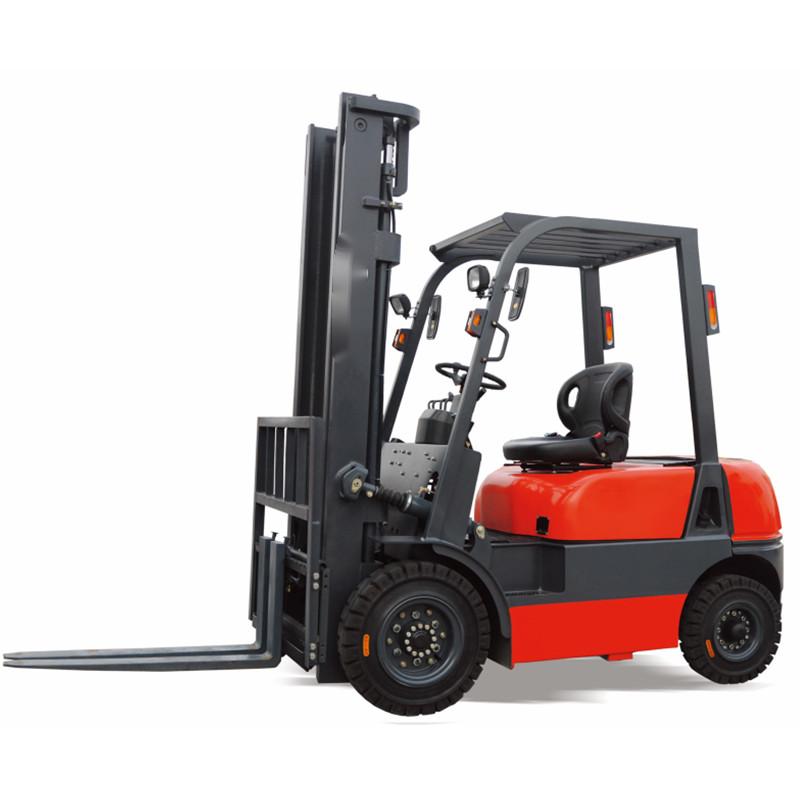As an important type of internal combustion forklift, diesel forklifts play a key role in various industries and scenarios due to their characteristics such as strong power, high load - bearing capacity, and adaptability to complex environments. The following is an explanation of their main application fields and specific scenarios:

I. Industrial Production Field
- Heavy manufacturing industry: In factories engaged in automobile manufacturing, mechanical processing, and heavy - duty equipment production, diesel forklifts are often used to transport heavy components (such as engine blocks, large machine tool accessories) and raw materials (steel, cast iron blocks). Their high load - bearing capacity (usually more than 5 tons, and can be customized to dozens of tons) can meet the needs of short - distance transportation of heavy goods.
- Turnover in workshops and factory areas: For the material transfer between factory workshops, warehouses, and yards, especially in outdoor or semi - open - air areas (such as the loading and unloading area outside the workshop, the main road of the factory area), diesel forklifts do not rely on charging facilities, can work continuously, and are suitable for scenarios with a fast production rhythm and high operation intensity.
II. Logistics and Warehousing (mainly outdoor)
- Ports and docks: In port container yards and bulk cargo terminals, diesel forklifts (especially container forklifts) are responsible for the short - distance transportation and stacking of containers, as well as the loading and unloading of bulk goods such as steel and wood. They can adapt to the open - air, humid, and dusty environment, have long - lasting power, and are suitable for high - intensity operations.
- Freight yards and logistics parks: In the cargo distribution points of long - distance freight, diesel forklifts are used for the loading and unloading operations of trucks and vans. Especially in open - air sites without fixed charging facilities, their advantage of not needing frequent charging is significant, and they can efficiently complete the transportation of large quantities of goods.
- Outdoor areas of large warehouses: For warehouses with outdoor storage areas (such as building materials warehouses and chemical raw material warehouses), diesel forklifts can handle heavy goods stacked in the open air (such as cement bags and barreled chemicals) and adapt to complex weather conditions such as wind and rain.
III. Construction and Infrastructure Industry
- Construction sites: In scenarios such as house construction and road construction, diesel forklifts are used to transport building materials (reinforcement bars, bricks, prefabricated panels) and construction tools (small mixers, scaffolding components). They can drive on muddy and uneven ground and withstand dust and vibration.
- Municipal engineering: When repairing urban roads and laying pipelines, diesel forklifts can assist in transporting pipes, sand, gravel, and engineering equipment, and adapt to the harsh environment of outdoor operations.
IV. Agriculture, Forestry, and Mining Industries
- Agriculture and forestry: In farms and forest farms, diesel forklifts are used to transport grain, feed, and wood. Especially in field operations, they do not rely on fixed power sources and can cooperate with tractors, harvesters, and other equipment to complete the collection and transportation of materials.
- Mines and quarries: They are used to transport heavy materials such as ores and gravel. Their durable tires and strong power can adapt to the rough and gravel - filled roads in mining areas and meet the needs of high - intensity and high - load operations.
V. Operations in Special Environments
- High - temperature or low - temperature environments: Compared with electric forklifts, the power system of diesel forklifts has stronger adaptability to temperature. They perform more stably when operating in high - temperature open - air sites in summer or outdoor in northern winter.
- High - dust and oily scenarios: Such as garbage disposal sites and metal processing waste recycling areas, the engines and mechanical structures of diesel forklifts are more resistant to dirt, and their maintenance costs are relatively low.
Core Advantages of Diesel Forklift Applications
- Strong power: They have large torque, are suitable for heavy loads (more than 5 tons) and climbing operations, and perform particularly well on uneven roads.
- Unlimited endurance: They can continue to work by refueling diesel without waiting for charging, and are suitable for long - time and high - intensity operation scenarios.
- Strong environmental adaptability: They are resistant to high and low temperatures, dust, and humidity, and do not rely on the infrastructure of the operation site (such as charging equipment).
However, diesel forklifts also have problems such as loud noise, pollutant emissions (traditional diesel models), and high fuel consumption. Therefore, their application in indoor enclosed spaces and places with strict environmental protection requirements (such as food factories and pharmaceutical warehouses) is limited, and they are mostly replaced by electric forklifts. But in outdoor, heavy - duty, and high - intensity operation scenarios, they are still indispensable equipment.


